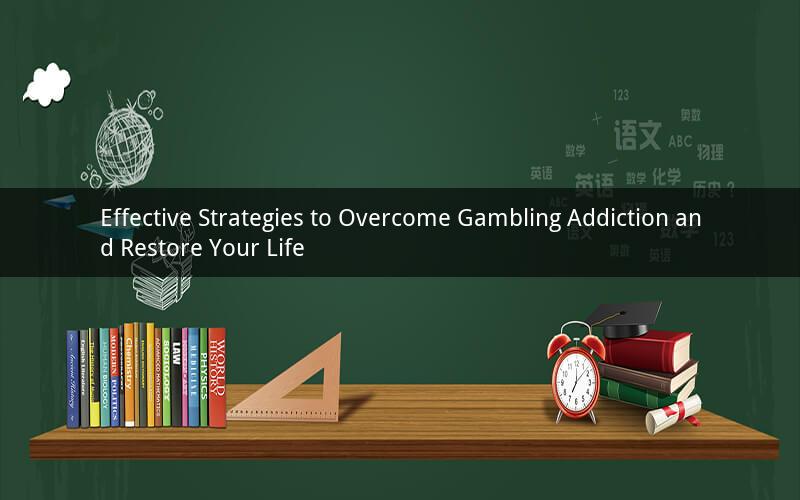
Gambling addiction is a serious issue that affects millions of people worldwide. If you're struggling with this problem and want to stop gambling now, you're not alone. This article will provide you with practical strategies and insights to help you overcome your addiction and regain control of your life.
1. Understand the Problem
The first step in overcoming gambling addiction is to acknowledge and understand the problem. Recognize that your gambling habits have become harmful and are negatively impacting your life. This could include financial, emotional, or social consequences.
1.1 Financial Consequences
Gambling addiction can lead to significant financial problems, such as debt, lost income, and financial stress. Acknowledge the extent of your financial struggles and commit to addressing them as part of your recovery process.
1.2 Emotional and Social Consequences
Gambling addiction can also cause emotional and social problems, such as anxiety, depression, and strained relationships with family and friends. Recognize the emotional and social consequences of your addiction and commit to improving your well-being and relationships.
2. Seek Professional Help
Professional help is crucial in overcoming gambling addiction. Consider consulting a therapist, counselor, or psychologist who specializes in addiction treatment. They can provide you with personalized support, coping strategies, and guidance throughout your recovery journey.
2.1 Therapy Options
Several therapy options are available to help you overcome gambling addiction, including cognitive-behavioral therapy (CBT), motivational interviewing, and group therapy. Your therapist will help you identify the underlying causes of your addiction and develop strategies to cope with triggers and cravings.
2.2 Support Groups
Support groups, such as Gamblers Anonymous, can provide you with a sense of community and support from others who are struggling with similar challenges. Sharing your experiences and learning from others' journeys can be incredibly beneficial in your recovery process.
3. Create a Support System
Building a strong support system is essential in overcoming gambling addiction. Surround yourself with people who are supportive, understanding, and committed to your recovery. This may include family members, friends, or professionals.
3.1 Family and Friends
Reach out to family and friends who can offer emotional support and encouragement. Share your struggles with them and ask for their help in maintaining your commitment to recovery. Remember, you are not alone in this journey.
3.2 Professional Support
Your therapist, counselor, or psychologist can also serve as part of your support system. Keep in touch with them regularly and discuss any challenges or setbacks you may face. They can provide guidance and resources to help you stay on track.
4. Develop Coping Strategies
Developing healthy coping strategies is crucial in overcoming gambling addiction. These strategies can help you manage stress, anxiety, and cravings without turning to gambling.
4.1 Stress Management Techniques
Learn stress management techniques, such as mindfulness, deep breathing exercises, and yoga, to help you cope with the pressures of daily life. These techniques can reduce the likelihood of relapse and improve your overall well-being.
4.2 Distraction Techniques
Find healthy distractions to occupy your time and prevent you from thinking about gambling. This could include hobbies, exercise, or engaging in social activities with friends and family.
5. Set Goals and Celebrate Progress
Setting goals and celebrating progress is an essential part of overcoming gambling addiction. Establish short-term and long-term goals that align with your recovery journey. When you achieve these goals, take the time to acknowledge and celebrate your success.
5.1 Short-Term Goals
Set short-term goals that are achievable and measurable, such as avoiding gambling for a specific period or attending therapy sessions regularly. Achieving these goals will give you a sense of accomplishment and motivate you to continue your recovery journey.
5.2 Long-Term Goals
Establish long-term goals that reflect your overall well-being and recovery, such as maintaining a healthy financial status, improving your relationships, and reducing stress. These goals will guide you in your journey towards a fulfilling life.
Frequently Asked Questions
1. Q: How long does it take to overcome gambling addiction?
A: The time it takes to overcome gambling addiction varies for each individual. Some people may experience recovery within a few months, while others may require years of dedication and support.
2. Q: Can I overcome gambling addiction on my own?
A: While it's possible to overcome gambling addiction on your own, seeking professional help and joining support groups can significantly improve your chances of successful recovery.
3. Q: Will I always be at risk of relapse?
A: Yes, you will always be at risk of relapse, even after overcoming gambling addiction. However, with effective coping strategies and support, you can minimize the likelihood of relapse and maintain your recovery.
4. Q: Can therapy help me overcome gambling addiction?
A: Yes, therapy can be an effective tool in overcoming gambling addiction. Professional therapists can help you identify the underlying causes of your addiction, develop coping strategies, and provide ongoing support throughout your recovery journey.
5. Q: How can I stay motivated during my recovery process?
A: Staying motivated during your recovery process involves setting achievable goals, celebrating your progress, and maintaining a strong support system. Surround yourself with positive influences and remind yourself of the reasons why you want to overcome your addiction. Remember, your recovery is a journey worth taking, and every step forward is a victory.